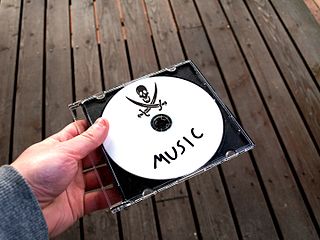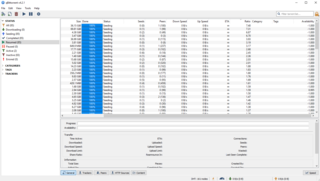Related Research Articles

A copyright is a type of intellectual property that gives the creator of an original work, or another right holder, the exclusive and legally secured right to copy, distribute, adapt, display, and perform a creative work, usually for a limited time. The creative work may be in a literary, artistic, educational, or musical form. Copyright is intended to protect the original expression of an idea in the form of a creative work, but not the idea itself. A copyright is subject to limitations based on public interest considerations, such as the fair use doctrine in the United States.

Warez is a common computing and broader cultural term referring to pirated software that is distributed via the Internet. Warez is used most commonly as a noun, a plural form of ware, and is intended to be pronounced like the word wares. The circumvention of copy protection (cracking) is an essential step in generating warez, and based on this common mechanism, the software-focused definition has been extended to include other copyright-protected materials, including movies and games. The global array of warez groups has been referred to as "The Scene", deriving from its earlier description as "the warez scene". Distribution and trade of copyrighted works without payment of fees or royalties generally violates national and international copyright laws and agreements. The term warez covers supported as well as unsupported (abandonware) items, and legal prohibitions governing creation and distribution of warez cover both profit-driven and "enthusiast" generators and distributors of such items.
Information goods are commodities that provide value to consumers as a result of the information it contains and refers to any good or service that can be digitalized. Examples of information goods includes books, journals, computer software, music and videos. Information goods can be copied, shared, resold or rented. Information goods are durable and thus, will not be destroyed through consumption. As information goods have distinct characteristics as they are experience goods, have returns to scale and are non-rivalrous, the laws of supply and demand that depend on the scarcity of products do not frequently apply to information goods. As a result, the buying and selling of information goods differs from ordinary goods. Information goods are goods whose unit production costs are negligible compared to their amortized development costs. Well-informed companies have development costs that increase with product quality, but their unit cost is zero. Once an information commodity has been developed, other units can be produced and distributed at almost zero cost. For example, allow downloads over the Internet. Conversely, for industrial goods, the unit cost of production and distribution usually dominates. Firms with an industrial advantage do not incur any development costs, but unit costs increase as product quality improves.

To counterfeit means to imitate something authentic, with the intent to steal, destroy, or replace the original, for use in illegal transactions, or otherwise to deceive individuals into believing that the fake is of equal or greater value than the real thing. Counterfeit products are fakes or unauthorized replicas of the real product. Counterfeit products are often produced with the intent to take advantage of the superior value of the imitated product. The word counterfeit frequently describes both the forgeries of currency and documents as well as the imitations of items such as clothing, handbags, shoes, pharmaceuticals, automobile parts, unapproved aircraft parts, watches, electronics and electronic parts, software, works of art, toys, and movies.
Copy protection, also known as content protection, copy prevention and copy restriction, describes measures to enforce copyright by preventing the reproduction of software, films, music, and other media.

Scanlation is the fan-made scanning, translation, and editing of comics from a language into another language. Scanlation is done as an amateur work performed by groups and is nearly always done without express permission from the copyright holder. The word "scanlation" is a portmanteau of the words scan and translation. The term is mainly used for Japanese manga, although it also exists for other languages, such as Korean manhwa and Chinese manhua. Scanlations may be viewed at websites or as sets of image files downloaded via the Internet.
Ripping is the extraction of digital content from a container, such as a CD, onto a new digital location. Originally, the term meant to rip music from Commodore 64 games. Later, the term was applied to ripping WAV or MP3 files from digital audio CDs, and after that to the extraction of contents from any storage media, including DVD and Blu-ray discs, as well as the extraction of video game sprites.

Peer-to-peer file sharing is the distribution and sharing of digital media using peer-to-peer (P2P) networking technology. P2P file sharing allows users to access media files such as books, music, movies, and games using a P2P software program that searches for other connected computers on a P2P network to locate the desired content. The nodes (peers) of such networks are end-user computers and distribution servers.

Brand piracy is the act of naming a product in a manner which can result in confusion with other better known brands. According to author Robert Tönnis The term brand piracy is unauthorized usage of protected brand names, labels, designs or description of trade. Annika Kristin states "brand Piracy is considered to be the premeditated use of registered trademark, its name, its tradename or the packaging and presentation of its products". It is a major loss to MNEs around the world as it causes a loss of revenue and image of the brand.
The Federation Against Copyright Theft (FACT) is a British organisation established in 1983 to protect and represent the interests of its members' intellectual property (IP). FACT also investigates fraud and cybercrime, and provides global due diligence services to support citizenship investment and trade, business, financial and legal compliance.

The Gesellschaft zur Verfolgung von Urheberrechtsverletzungen e.V. is a registered association under German law. According to its own description it works for the video game industry and film industry and helps to protect intellectual property and to counter the illegal distribution of copied materials. For this purpose, the association cooperates with the Motion Picture Association of America.
File sharing is the practice of distributing or providing access to digital media, such as computer programs, multimedia, program files, documents or electronic books/magazines. It involves various legal aspects as it is often used to exchange data that is copyrighted or licensed.

Peter Sunde Kolmisoppi, alias brokep, is a Swedish entrepreneur and politician. He is best known for being a co-founder and ex-spokesperson of The Pirate Bay, an illegal BitTorrent search engine. He is an equality advocate and has expressed concerns over issues of centralization of power to the European Union in his blog. Sunde also participates in the Pirate Party of Finland and describes himself as a socialist. In April 2017, Sunde founded Njalla, a privacy oriented domain name registrar, hosting provider and VPN provider.
Today music copyright is enforced in China. According to the International Federation of the Phonographic Industry 97% Chinese consumers were listening to licensed music in 2021. In 2018 the rate was 96% of Chinese, which was a much higher amount than the global average of 62%.
International Federation of the Phonographic Industry Greece, or simply IFPI Greece, is the Greek branch of the International Federation of the Phonographic Industry (IFPI) and is the official charts provider and recording sales certification body for Greece. The association compiles and publishes a Top 75 album sales chart. The chart is sponsored by Cyta Hellas.
Digital rights management (DRM) is the management of legal access to digital content. Various tools or technological protection measures (TPM), such as access control technologies, can restrict the use of proprietary hardware and copyrighted works. DRM technologies govern the use, modification and distribution of copyrighted works and of systems that enforce these policies within devices. DRM technologies include licensing agreements and encryption.

Copyright infringement is the use of works protected by copyright without permission for a usage where such permission is required, thereby infringing certain exclusive rights granted to the copyright holder, such as the right to reproduce, distribute, display or perform the protected work, or to make derivative works. The copyright holder is typically the work's creator, or a publisher or other business to whom copyright has been assigned. Copyright holders routinely invoke legal and technological measures to prevent and penalize copyright infringement.
Counterfeit consumer goods—or counterfeit, fraudulent, and suspect items (CFSI)—are goods, often of inferior quality, made or sold under another's brand name without the brand owner's authorization. The colloquial terms knockoff or dupe (duplicate) are often used interchangeably with counterfeit, although their legal meanings are not identical.

Music piracy is the copying and distributing of recordings of a piece of music for which the rights owners did not give consent. In the contemporary legal environment, it is a form of copyright infringement, which may be either a civil wrong or a crime depending on jurisdiction. The late 20th and early 21st centuries saw much controversy over the ethics of redistributing media content, how much production and distribution companies in the media were losing, and the very scope of what ought to be considered piracy – and cases involving the piracy of music were among the most frequently discussed in the debate.

Online piracy or software piracy is the practice of downloading and distributing copyrighted works digitally without permission, such as music or software. The principle behind piracy has predated the creation of the Internet, but its online popularity arose alongside the internet. Despite its explicit illegality in many developed countries, online piracy is still widely practiced, due to both the ease with which it can be done, the often defensible ethics behind it, and access to files that would normally cost money. Some of the most pirated software includes Adobe software and Microsoft Office.
References
- ↑ Joe Karaganis (2011). Media Piracy in Emerging Economies. Lulu.com. p. 54. ISBN 978-0-9841257-4-6.
- ↑ Barry Kernfeld (1 October 2011). Pop Song Piracy: Disobedient Music Distribution Since 1929. University of Chicago Press. p. 3. ISBN 978-0-226-43183-3.
- ↑ Brett Robert Caraway (25 February 2013). "Survey of File-Sharing Culture". In Manuel Castells; Gustavo Cardoso (eds.). PIRACY CULTURES: How a Growing Portion of the Global Population is Building Media Relationships Through Alternate Channels of Obtaining Content. Xlibris Corporation. p. 228. ISBN 978-1-4797-3227-2.
- 1 2 Peter Tschmuck; Philip Pearce; Steven Campbell (16 April 2013). Music Business and the Experience Economy: The Australasian Case. Springer Science & Business Media. p. 81. ISBN 978-3-642-27898-3.
- 1 2 Hossein Bidgoli (2004). The Internet Encyclopedia. John Wiley & Sons. p. 301. ISBN 978-0-471-22203-3.
- ↑ OECD (19 June 2008). The Economic Impact of Counterfeiting and Piracy. OECD Publishing. p. 142. ISBN 978-92-64-04552-1.
- ↑ Victoria L. Crittenden (13 March 2015). Proceedings of the 1992 Academy of Marketing Science (AMS) Annual Conference. Springer. p. 265. ISBN 978-3-319-13248-8.
- ↑ Clifton D. Bryant (27 April 2012). Routledge Handbook of Deviant Behavior. Taylor & Francis. p. 437. ISBN 978-1-134-01557-3.
- 1 2 3 Sean Swan, ed. (2012). On the Cyber. Lulu.com. pp. 15–16. ISBN 978-1-105-70991-3.
- 1 2 3 Martin Cave; Kiyoshi Nakamura (1 January 2006). Digital Broadcasting: Policy and Practice in the Americas, Europe and Japan. Edward Elgar Publishing. p. 167. ISBN 978-1-84720-160-7.
- ↑ Harry Henderson (2009). Encyclopedia of Computer Science and Technology. Infobase Publishing. p. 445. ISBN 978-1-4381-1003-5.
- ↑ Lionel Bently; Jennifer Davis; Jane C. Ginsburg (28 October 2010). Copyright and Piracy: An Interdisciplinary Critique. Cambridge University Press. p. 393. ISBN 978-1-139-49222-5.
- ↑ Sandra Weber (1 August 2003). The Personal Computer. Infobase Publishing. p. 89. ISBN 978-0-7910-7450-3.
- ↑ "CD Projekt – Pirated games are not lost sales, DRM is "a lot" for legitimate users to put up with". VG247.com. 19 May 2012. Retrieved 2016-06-08.
- ↑ Edward Lee (November 2013). The Fight for the Future: How People Defeated Hollywood and Saved the Internet—For Now. Lulu.com. p. 12. ISBN 978-1-304-58361-1.
- ↑ "Copyright Math: the best TED Talk you'll watch all year". Boing Boing. 2012-03-16. Retrieved 2016-06-08.
- ↑ "From gigabytes to petadollars: copyright math begets copyright currency". Ars Technica. 12 June 2012. Retrieved 2016-06-08.
- ↑ Raustiala, Kal; Sprigman, Chris (2012-01-12). "How Much Do Music and Movie Piracy Really Hurt the U.S. Economy?". Freakonomics. Retrieved 2016-06-08.
- ↑ "How Copyright Industries Con Congress". Cato Institute. 2012-01-03. Retrieved 2016-06-08.
- ↑ "Judge: 17,000 illegal downloads don't equal 17,000 lost sales". Ars Technica. 19 January 2009. Retrieved 2016-06-08.
- ↑ "Pirate Bay Founder Builds the Ultimate Piracy Machine". 19 December 2015. Retrieved 25 December 2015.
- ↑ S.A, Wirtualna Polska Media (2012-08-28). "Strata Kazika, czyli jak ukraść 86 milionów złotych". tech.wp.pl (in Polish). Retrieved 2020-03-11.
- ↑ "Twórca "Straty Kazika": Dość szantażu moralnego w przemyśle muzycznym, piractwo to zdrowa kultura". naTemat.pl (in Polish). Retrieved 2020-03-11.